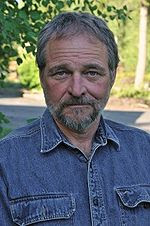Leviticus Chapter 26
26:26 When I break the staff of your bread, ten women shall bake your bread in one oven, and shall deliver you the bread again by weight; and ye shall eat, and not be satisfied.
STAFF OF LIFE.
My wife has been baking bread lately (and very good it is too), and this morning as I was gazing fondly at the latest loaf the phrase "staff of life" popped into my head and I wondered about it. The metaphor seemed clear—a staple food is something you lean on—but still somewhat odd, and I wondered if there were a backstory. I went, of course, to the OED, where I found the phrase as definition 4c (first cite: 1638 PENKETHMAN Artach. Ajb,
"Bread is worth all, being the Staffe of life," where Artach. = Artachthos; or a new booke declaring the assise or weight of bread); definition 4b, which gave rise to it, is:
In the Biblical phr. to break the staff of bread (literally from Heb. maṭṭēh 'leχem, Vulg. baculum panis), to diminish or cut off the supply of food.
1382, 1388 WYCLIF Lev. xxvi. 26. 1560 BIBLE (Geneva) Lev. xxvi. 26. Ps. cv. 16. Ezek. iv. 16. [And so 1611]. c1586 C'TESS PEMBROKE Ps. CV. iv, Scarse had he spoken, When famine came, the staff of bread was broken. 1596 BARLOW Three Serm. i. 121 God in his lawe threatneth that he will breake the staffe of bread, that is, bread shall not nourish them that eate it.
So it's a metaphor specific to the Hebrew Bible that managed to get solidly rooted in the English language; a quick look through my dictionaries suggests English is unique in that respect—staff of life is defined by phrases that translate to 'most important foodstuff,' 'support of life,' and the like. (The Hebrew word mateh, incidentally, now means 'military staff': mateh ha-klali 'General Staff.')

Richard Manning is an award-winning environmental author and journalist, with particular interest in the history and future of the American prairie, agriculture and poverty. He writes frequently about trauma and poverty for the National Native Children's Trauma Center based at the University of Montana, where he is a senior research associate.
Listen or download MP3
In this episode, I interview Richard Manning, essayist and author of a number of books about agriculture and civilization. In this interview, we talk with Richard about the beginning of agriculture, the role annual grasses have played in shaping agriculture and civilization, the importance of grasslands, and the key to finding individual food niches within our local food sheds. This one is not to be missed.




![Reblog this post [with Zemanta]](http://img.zemanta.com/reblog_e.png?x-id=4707a961-bd9b-4075-be3a-e53ed2a7e227)
No comments:
Post a Comment